Old Irish Coins
Pre-Decimal Coins
The Irish Free State government passed the Coinage Act in 1926 which empowered the Minister for Finance to make and issue silver, nickel and bronze coins. A committee was established to choose designs for these new Irish coins. This committee was headed by WB Yeats and it recommended that the coins feature a series of native animals because of their central importance to the mainly agricultural economy of Ireland.
Percy Metcalfe (1895-1970) was the winner of the design competition for the pre-decimal coins. The first Irish coin series consisted of eight coins: farthing, halfpenny, penny, threepence, sixpence, shilling, florin and half-crown. These coins were first issued on 12 December 1928.
|
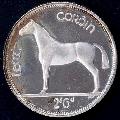
Denomination: 2/6 (Half-crown)
Design: Horse
Weight (g): 14.14
|
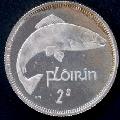
Denomination: 2/= (Florin)
Design: Salmon
Weight (g): 11.31
|
|
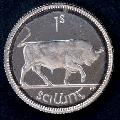
Denomination: 1/= (Shilling)
Design: Bull
Weight (g): 5.66
|
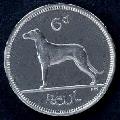
Denomination: 6d (Sixpence)
Design: Wolfhound
Weight (g): 4.54
|
|
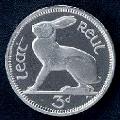
Denomination: 3d (Threepence)
Design: Hare
Weight (g): 3.24
|
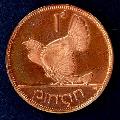
Denomination: 1d (Penny)
Design: Hen with chickens
Weight (g): 9.45
|
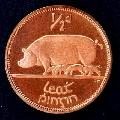
Denomination: 1/2d (Half-penny)
Design: Pig with piglets
Weight (g): 5.67
|
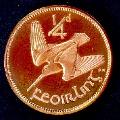
Denomination: 1/4d (Farthing)
Design: Woodcock
Weight (g): 2.83
|
Obverse
The harp was chosen for the obverse of the coins, as it had been the heraldic emblem of Ireland for many centuries. The design of the harp featured on the coins is Metcalfe’s adaptation of the ‘Brian Ború Harp’, located in Trinity College Dublin.
The words ‘Saorstát Éireann’ (Irish Free State) appeared on the obverse of the coins from 1928 to 1939. In 1939 the word ‘Éire’ replaced ‘Saorstát Éireann’ and minor alterations were made to the horse, hen and harp.
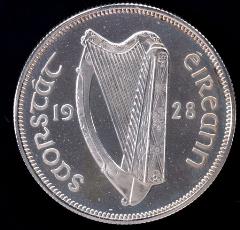
In 1942 the composition of the sixpence and threepence was changed from nickel to cupro-nickel. From 1951 the half-crown, florin and shilling were struck in cupro-nickel.
Decimal Currency
Transcript of the Anniversary of Decimal Day (PDF 54.42KB)
On 15 February 1971, Ireland’s currency was changed over to the decimal system. The Metcalfe designs were retained, apart from minor modifications, up to the demonetisation of the farthing and halfpenny in 1969. With the introduction of decimal currency in 1971, the penny, threepence, sixpence and half-crown were also withdrawn.
The shilling and florin coins were of equal value with the new 5p and 10p coins and the original designs were therefore adopted for these new coins. In addition, the woodcock design was adopted from the demonetised farthing to appear on the new 50p coin.
New designs were necessary for three decimal coins: the ½p, 1p and 2p. A noted Irish sculptor and artist, Gabriel Hayes (1909-1978), was commissioned to design these coins. The designs are based on ornamental details from Irish art illuminations contained in old manuscripts.
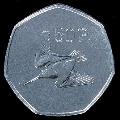
Denomination: 50p Design: Woodcock Diameter (mm): 30 Weight (g): 13.50 | 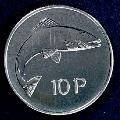
Denomination: 10p Design: Salmon Diameter (mm): 22 Weight (g): 5.45 |
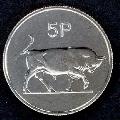
Denomination: 5 p Design: Bull Diameter (mm): 18.50 Weight (g): 3.25 | 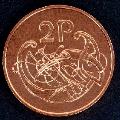
Denomination: 2p Design: Ornamental bird detail Diameter (mm): 25.91 Weight (g): 7.13 |
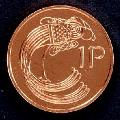 Denomination: 1p Design: Ornamental bird detail Diameter (mm): 20.32 Weight (g): 3.56 | 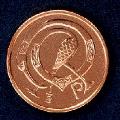
Denomination: 1/2p (half-penny) Design: Ornamental bird detail |
In 1986 the 20p coin was introduced. The design was again taken from an original pre-decimal coin design: the horse from the half-crown.
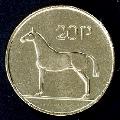
Denomination: 20p Design: Horse Diameter (mm): 27.10 Weight (g): 8.47 | 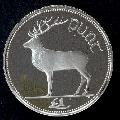
Denomination: £1 Design: Red Deer Diameter (mm): 31.10 Weight (g): 10.00 |
On 20 June 1990, Ireland issued its first pound coin. This was issued to replace the £1 note and was designed by Thomas Ryan. In keeping with the original Metcalf animal motifs, the red deer, which is native to Ireland, was chosen for the design of the £1 coin.
Transcript - Video on £1 Coin (PDF 96.86KB)
Ireland officially adopted the euro as its currency on 1 January 1999. In advance of the euro changeover in 2002, the Irish Mint commenced full production of euro coins in August 1999. Production of IR£ ceased in September 2000 with the Millennium £1 circulating coin being the last national coin to be struck by the Irish Mint.
You can continue to exchange old Irish banknotes and coins into euro.